On Tuesday night, after apologising again to the House of Commons for breaking lockdown rules, Boris Johnson addressed a private meeting of Tory MPs. He had a message for his critics: ‘This is the beginning of the end.’ ‘For a minute, I thought he was talking about himself,’ says one MP. In fact, the Prime Minister was referring to his belief that the biggest political scandal of his premiership is reaching its finale – one in which he comes out on top.
Some of the MPs in attendance struggled to see much to be optimistic about. Johnson subjected the country to draconian lockdown rules which the police have found he did not observe, making him the first prime minister in history to admit to breaking the law while in office. He had promised the House of Commons that he had not broken any rules, so now the opposition parties are plotting ways to maximise pain for the Tories over whether he knowingly misled the house: a resigning offence. Labour enjoys a consistent poll lead – and is even ahead as the party of low taxation. One forecast projects a loss of 800 Conservative council seats in next month’s local elections.
And yet, despite all this, things are not as bad for Johnson as they were three months ago, when MPs were on the brink of reaching 54 letters of no confidence and triggering a vote on his leadership. In recent weeks, more MPs have retracted their calls for him to go – including the Scottish Conservative leader Douglas Ross. ‘I think Boris has got away with it,’ says a former minister. ‘The most likely scenario now is that he leads us into the next election. But what happens then, no one knows.’
The Tories are about seven points behind in the polls, but David Cameron and John Major would have killed for such a narrow gap at the same time in their premierships. Even a loss of 800 council seats would be mild compared to the 1,300 seats lost under Theresa May in May 2019. ‘Expectations are drilled so far into the dirt, people won’t be surprised if we get hammered,’ says one senior government figure.
‘If this is the Prime Minister at his lowest, think how it will be once we have moved past this,’ argues one Johnson loyalist. The Prime Minister’s supporters are confident they can turn the current situation around, even if a recent poll found that the word most associated with Johnson was ‘liar’. He has a new inner circle: chief of staff Steve Barclay, head of policy Andrew Griffith, deputy chief of staff David Canzini (an ally of Lynton Crosby), comms chief Guto Harri, permanent secretary Samantha Jones (a former volunteer with the Israeli army), and Samantha Cohen, previously a royal aide. They are focused on repairing ties with the parliamentary party and making the No. 10 operation less managerial.
Their aim is to stop backbench rebellions over policies that are designed to please the right of the party. The plan to process refugees in Rwanda has caused uproar among One Nation Tories, but polls show that it’s popular with the public. The government is also battling the civil service, in the form of a crackdown on Whitehall’s work-from-home culture (which James Heale writes about), and plans to privatise Channel 4, which is seen by some as the Tories taking revenge for too much left-wing analysis.
These policies have not allowed the Conservatives to take the lead over Labour, but it does all come pretty close to the right-wing agenda that any plausible challenger to Johnson would offer. This is perhaps the biggest reason for his survival: it’s a lot harder to imagine who a successor to Johnson could be after the sudden implosion of Rishi Sunak. The Chancellor is reeling from a mini-Budget that misfired (his tax rises worsening the cost-of-living crisis), his angry reaction to questions about his wife’s non-dom tax status, and the news that he held a US green card while in No. 11.
For two years, the Chancellor was hugely popular and Labour found him a difficult opponent to attack. Now his enemies have a narrative they plan to push: that he stands exposed as a member of the out-of-touch global elite whose Green Card and wife’s non-dom status suggest he’d jet back off to Santa Monica in a heartbeat. Following a long stint as the bookies’ favourite to succeed Johnson, a poll this week shows Sunak doesn’t make it into the top five, trumped by ‘A Conservative MP’ and ‘Don’t know’. ‘The biggest factor helping Boris is that Rishi also has a fine,’ says a member of government. ‘Rishi has shown himself to be politically naive while Boris has been getting his act together,’ says one member of the 2019 intake.
If Sunak is not in the running, any immediate leadership contest starts to look unpredictable and unappealing, particularly as other previous ‘safe bet’ candidates now seem no less risky. ‘Sajid can’t run after admitting to being a non-dom in the past,’ says one senior Tory. Other super-wealthy Tory MPs – such as the Education Secretary Nadhim Zahawi – are now seen with suspicion. ‘We’re in a cost-of-living crisis – everything is more complicated,’ explains a minister.
Ben Wallace, the defence secretary, is the new favourite among Tory MPs, thanks to his handling of the Ukraine crisis. He is credited for persuading the Prime Minister to send defensive weaponry to Ukraine ahead of Russia’s invasion, against opposition from his own department and Whitehall generally. But when it comes to the scrutiny a leadership candidate would face, he is untested.
The other frontrunner is Liz Truss. Her admirers in the party point out that the non-dom crisis isn’t bad for the Foreign Secretary. ‘It turns out there are upsides to being one of the poorest members of cabinet,’ says a party figure, suggesting Truss has little in the way of financial skeletons in her closet. But there are enough MPs in the parliamentary party who take an ‘anyone but Truss’ position to make her path to power difficult.
For now, it seems likely that Tory MPs will stick with Johnson for the same reason they kept Theresa May for so long: they can’t agree on who should follow. ‘For the first time it is dawning on many colleagues that there’s a real chance the Tories will lose the next election,’ says a senior party figure. ‘A majority of 80 does not guarantee another win – and Labour don’t need a majority to govern.’ The polling that is of particular concern for Tory strategists is that on the economy the Conservative lead over Labour has collapsed. As of this month, YouGov finds that the parties draw on the issue. Labour is now seen as more likely to keep taxes low.
Johnson could exert his power after a bad local election result by calling a cabinet reshuffle and moving his wounded Chancellor. But this would present two problems. There’s no easy solution for a cost-of-living crisis, and a new chancellor more likely to assuage No. 10’s borrow-and-spend instincts could spook the Bank of England.
Plus, a weakened Sunak may be exactly what Johnson needs. ‘Boris is the ultimate pro-competition laissez-faire politician until it comes to himself,’ says a former minister. ‘He wants those around him not to pose a threat. It suits him to have a vassal chancellor.’ One party old hand believes the person who would benefit most from a change of chancellor would be Sunak: ‘He needs to get to another department and regroup – but not the Home Office.’
When David Canzini took over as Johnson’s new deputy chief of staff in March, he said the government’s main priority was delivering Brexit opportunities. That has already changed – now the cost-of-living crisis tops the list. Johnson thinks he can win back Tory doubters by handling all of this in a Conservative way. He has been talking about a plan for growth from investment and skills to free ports.
He will attempt to seize the initiative next week by chairing a meeting with secretaries of state where each will be asked to come up with a way to ease the cost-of-living crisis. ‘It shouldn’t just be all on Rishi to hand out dough,’ says a senior government figure. Measures under review include raising the cap for the maximum number of children a childminder can look after – which currently stands at six children under the age of eight. ‘Jacob looks after six and he’s not even a professional,’ says a party figure (though Rees-Mogg has admitted on the record that he has never changed a nappy).
The best-case scenario touted by Johnson optimists is that after a long shaky start, he has now found his feet and will govern as he did in his City Hall days: as a liberal Tory keeping council tax down while launching grands projets. ‘He had to focus first on pushing Brexit through,’ says a confidante of the Prime Minister. ‘Then the pandemic came and he was “following the science” and doing deeply illiberal things. At last he has a chance to do what he does best – what his instincts are.’ A focus on a conservative agenda – one which pleases the right of his party – is also viewed as the Tories’ route to a fifth term.
Johnson’s handling of Britain’s response to the war in Ukraine has also boosted his standing among Tory members. The official line – as parroted by loyal Tory MPs both in the Chamber and in the media – is that a European war means there’s no time for a lengthy leadership contest. As Sir Geoffrey Clifton-Brown, a senior Tory backbencher, put it: ‘The process of electing a new prime minister will take at least two months. With all that instability that it will cause, I think it is right to wait until the investigation is concluded before making a judgment.’
But things can always get worse. ‘There are worse challenges coming,’ warns a Tory grandee. The biggest concern among Tory MPs is that the police investigation will bring more fines for the Prime Minister. ‘He has been fined over a birthday cake in working hours – that’s the thin end of the wedge,’ says a government aide. If Johnson is found guilty of many more lockdown offences – including in the Downing Street flat – then his party could still turn on him. He’s being saved not by personal loyalty, but by a feeling on the Tory backbenches that he’s better than any likely alternative. This calculation could change at any moment.
The Prime Minister has survived longer into the partygate scandal than his critics predicted. But he is still in a volatile position. For all his talk of the beginning of the end, Johnson has some way to go yet before he is safe.
Got something to add? Join the discussion and comment below.
Get 10 issues for just $10
Subscribe to The Spectator Australia today for the next 10 magazine issues, plus full online access, for just $10.
You might disagree with half of it, but you’ll enjoy reading all of it. Try your first month for free, then just $2 a week for the remainder of your first year.


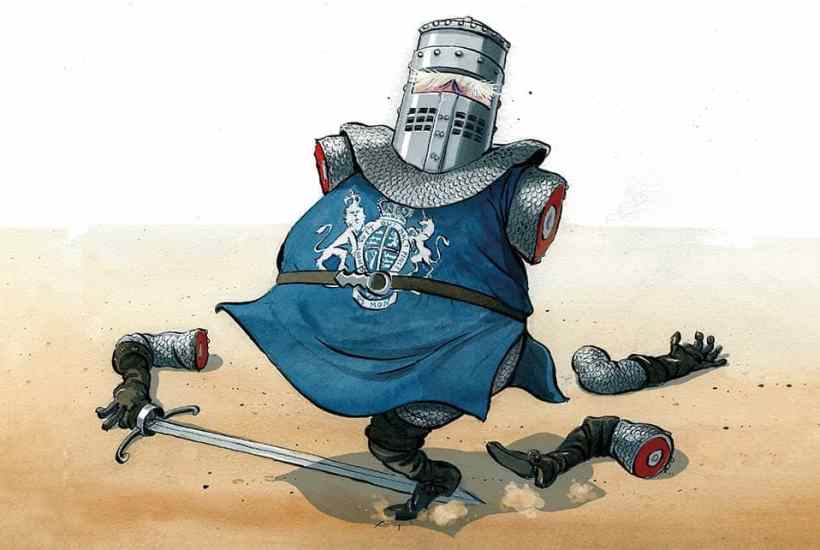
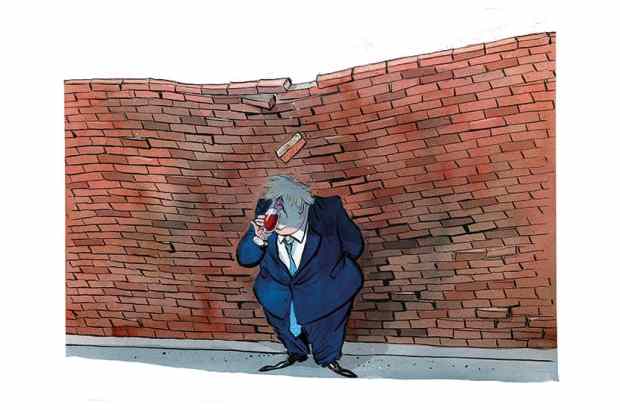
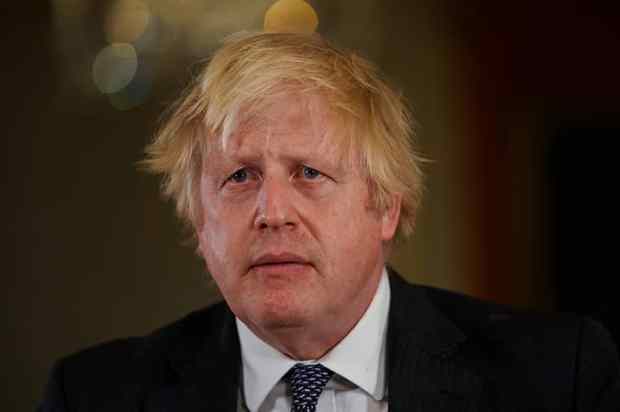
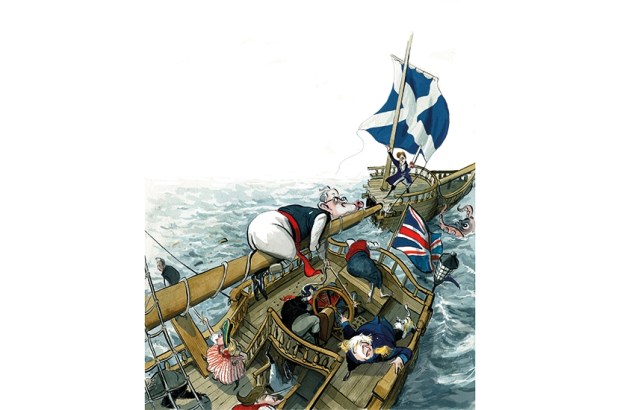
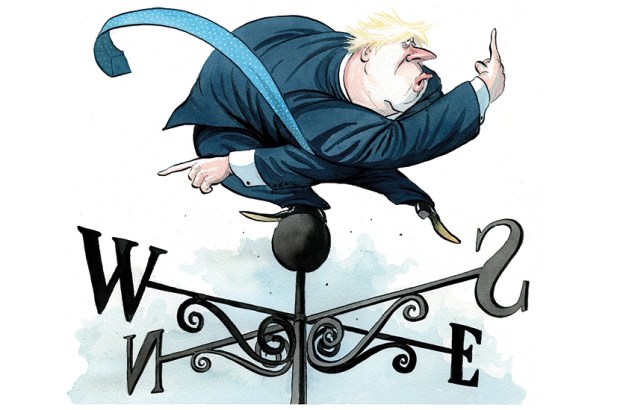
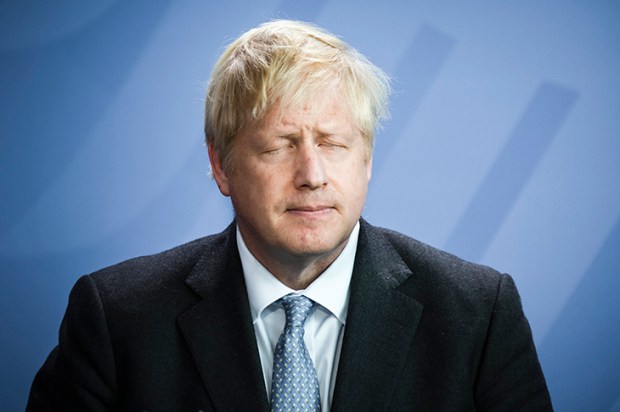
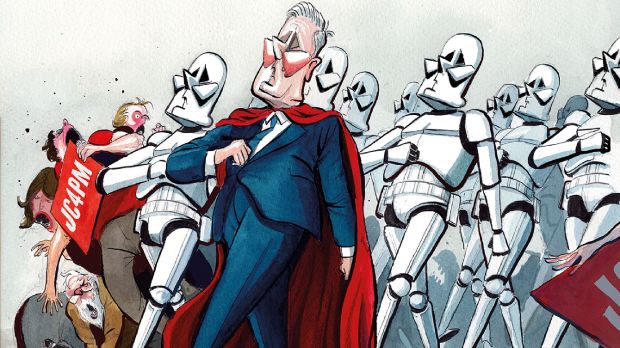






Comments
Don't miss out
Join the conversation with other Spectator Australia readers. Subscribe to leave a comment.
SUBSCRIBEAlready a subscriber? Log in